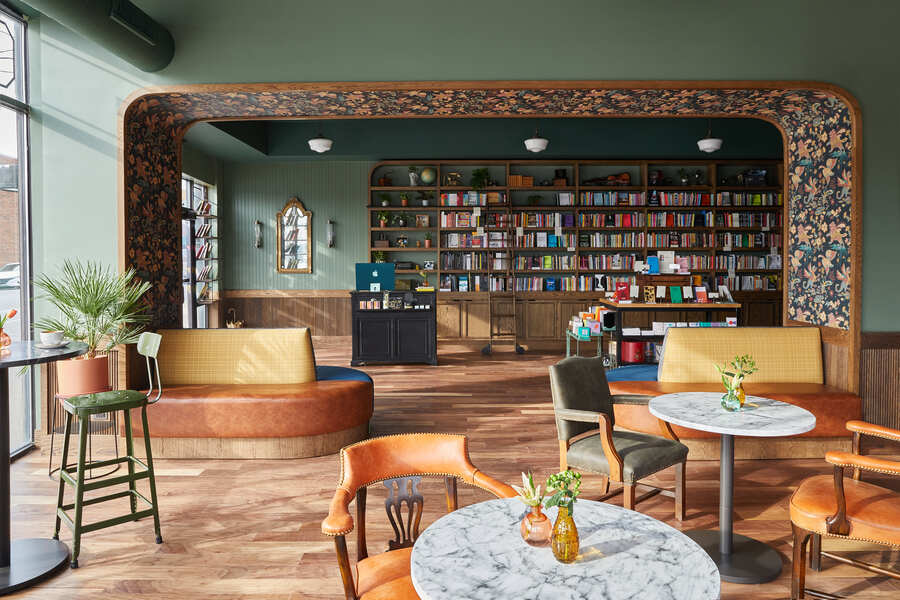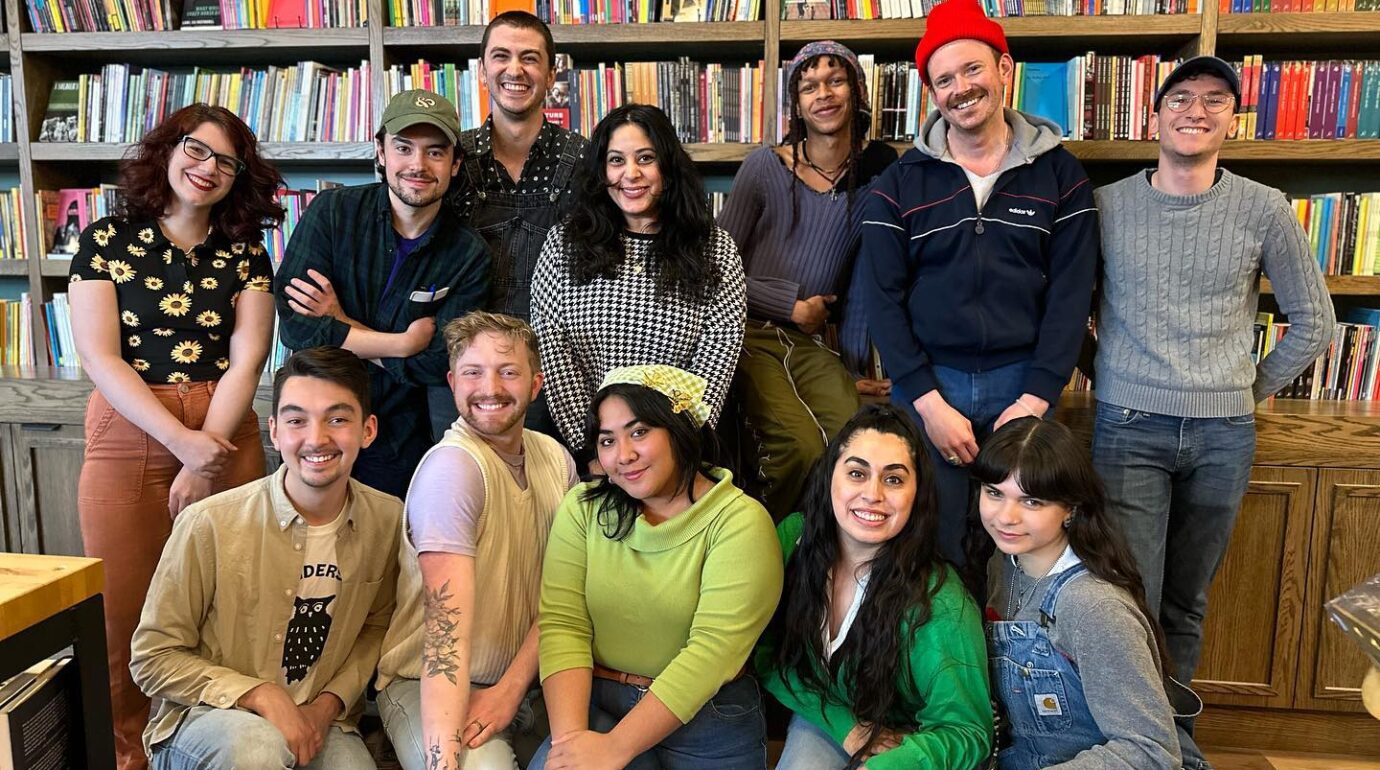At long last The Understudy Coffee and Books has made its entrance in Chicago. Co-owners Danny Fender and Adam Todd Crawford are the partners (in both senses) behind the highly anticipated theatre bookstore and café, which opened last weekend in the neighborhood of Andersonville. They join a much missed lineage of theatre bookstores in Chicago, which the city hasn’t seen since the 1990s.
Many theatre-philes are quick to compare the new venture to the Drama Book Shop in New York. But while that NYC mainstay does host book events, The Understudy’s owners say they’re taking a dynamic, communal, multi-use approach to their space.
“The Understudy is really capturing that idea of collaboration and process,” said Fender. Just as Drama Book Shop “reflects New York and its community and its values,” he and Craword want The Understudy “to feel like Chicago in all the different ways it manifests itself.” The Understudy has rotating displays atop wheeled shop tables, curated by Chicago artists. They are also providing a new hub for itinerant theatre companies seeking space for readings and workshops, as their modular seating and furniture is adaptable to the needs of working artists.
Both Fender and Crawford are artist-workers in their own rights: one is a stage manager, the other an actor. And though Fender primarily grew up in East Tennessee, he notes that he and Crawford were in each other’s orbits before they met at the Theatre School at DePaul University during undergrad.
“We were both born in Columbus, Ohio, which is funny now that we are life partners, because I actually grew up, for the first five years of my life, in a very small town close to where his family lives,” said Fender. He recalled that his parents first stuck him in football, and when that didn’t stick, tried bagpipe lessons. Finally his mom enrolled him in community theatre, where he took a liking to acting and later found stage management at Interlochen Center for the Arts.
Crawford’s story is similar. “Just like Danny, my parents tried to get me into everything when I was very small: I was a toddler in tee-ball, I did soccer, they took me to the symphony to see if I liked music. But the thing that really stuck was going to the Ohio Theatre—it’s one of those classic movie palaces with lots of gilding and red velvet and tassels and drapery and big balconies and this enormous proscenium.” Crawford was drawn to the impossibility of theatre, and continues to hold onto a sense of curiosity, collectivity, and play.

The idea of starting a bookstore/café was a daydream that emerged while Crawford was studying at DePaul, where he struggled to find compelling monologues and scripts. As he spent hours researching material online, he missed the ability to hold physical books and flip through them.
“There are obviously selections at every wonderful independent bookstore here in Chicago, but they’re reasonably limited by the fact that that’s not their whole audience base,” Crawford said. “With the number of theatres here in Chicago, we deserve a bigger, broader, better resource to be able to support and supplement our art.”
When the pandemic hit, the pause and disruption that descended upon the theatre industry gave Fender and Crawford time to reflect on what they were missing. Over and over, they came back to the loss of community, of spaces to gather, as theatres shuttered, sometimes permanently.
Fender and Crawford’s search for a space didn’t start in Andersonville, one of Chicago’s popular gayborhoods on the north side of the city. This “shop local capital of Chicago” supports the largest network of local and independent businesses in the area, leaving one to wonder if it was the most equitable choice to double down on a legacy of investing in areas of Chicago that are already well resourced. Crawford affirmed, “One of our primary goals was to be accessible to as many people as possible, and I think with a legacy of segregation here in Chicago, [the location] limits that potential to a certain degree.”
Crawford also recognizes his privilege in “having a family of entrepreneurs that could help us financially kickstart the whole process. In a way more important than the money, there is major gatekeeping in real estate jargon and financial language that is totally impenetrable.” He added, “I don’t ever want to operate under the illusion that we are self-made—we are entirely community-made.” One challenge they did face: Being young 20somethings meant that they weren’t taken as seriously as some competing business ventures.
But if Fender and Crawford originally shied away from Andersonville’s wealth of bookstores and coffee shops, it was the Andersonville Chamber of Commerce that wooed and won them over. What could have been competition instead became collaboration, as the strength of a network of small business owners became more apparent.

Originally set to debut last summer, The Understudy’s opening was delayed until this March. In the meantime, Fender and Crawford embraced a pop-up model which extended the reach and accessibility of their books beyond their still-pending Andersonville location. The duo fielded requests with other local small businesses looking to collaborate. Adam recalls, “Our very first ever pop-up was at Women & Children First, because they reached out to us and said, ‘Hey, it’s Independent Bookstore Day, would you like to do a pop-up and like show off your new space?’”
They felt an ever-present generosity in time and knowledge-sharing among other small businesses in the area eager to welcome the new bookshop and café. Added Fender, “The same with AlleyCat Comics. They reached out to us too around Halloween for a pop-up. We curated some titles we felt fit the Halloween season. We dressed up as the Heathers from Heathers the Musical, which was already a part of our Halloween costume.” Even now that they’ve opened their one space, they plan to continue to work with local businesses, and to have a presence in lobbies and community festivals across Chicago.
The delayed opening allowed them to further hone in on the purpose and details of The Understudy. Said Crawford, “We were frustrated every time there was a delay, because we just wanted to be open. But now we are opening a vastly better version of The Understudy than we would have last July. Every time we got delayed, we met a new amazing direct-trade tea vendor, or we found a new piece of incredible equipment. We just kept finding new incredible pieces for the catalog and deepened our curation.”
Their catalog features a selection of over 3,000 titles hand-selected by Fender and Crawford with the support of professionals at Dramatists Play Service. They dove deep into various publishers’ back catalogs to make sure they were representing as many voices, perspectives, and genres as possible. Crawford sees this as a sort of “starting representation,” as they will “remain responsive to what people want, what people need, and what people are buying.”
Crawford acknowledged, “The version of The Understudy that’s going out in the world now is just so much more thoughtful and mature and community-led.” Added Fender, “As a stage manager, for me it always comes back to the people. I love working with people and on teams—that collaborative aspect. The store is an extension of that, creating a place where we can foster and cultivate community.”
Yasmin Zacaria Mikhaiel (they/she) is Chicago-based dramaturg, arts journalist, and adjunct professor. Learn more at yasminzacaria.com and follow them on Twitter @yasminzacaria.


